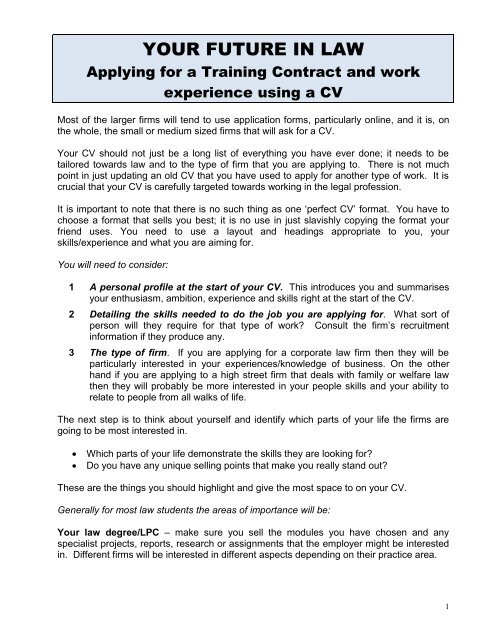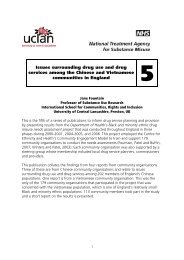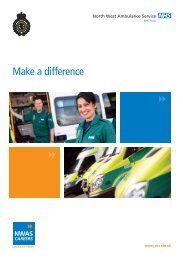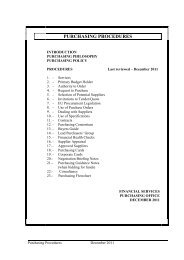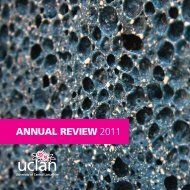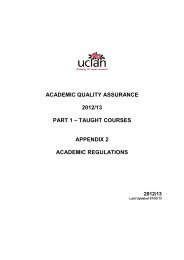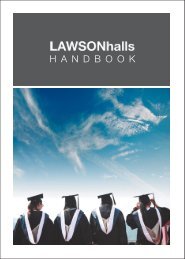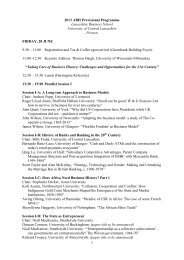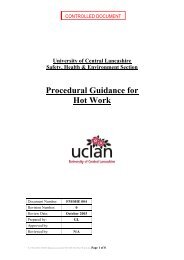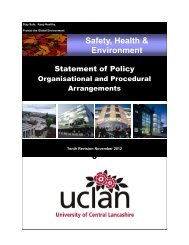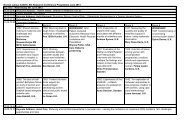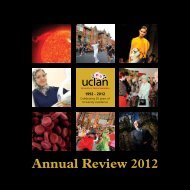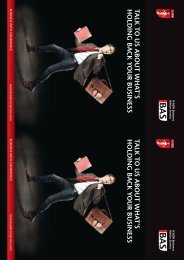Applying for a Training Contract and Work Experience with your CV
Applying for a Training Contract and Work Experience with your CV
Applying for a Training Contract and Work Experience with your CV
You also want an ePaper? Increase the reach of your titles
YUMPU automatically turns print PDFs into web optimized ePapers that Google loves.
YOUR FUTURE IN LAW<br />
<strong>Applying</strong> <strong>for</strong> a <strong>Training</strong> <strong>Contract</strong> <strong>and</strong> work<br />
experience using a <strong>CV</strong><br />
Most of the larger firms will tend to use application <strong>for</strong>ms, particularly online, <strong>and</strong> it is, on<br />
the whole, the small or medium sized firms that will ask <strong>for</strong> a <strong>CV</strong>.<br />
Your <strong>CV</strong> should not just be a long list of everything you have ever done; it needs to be<br />
tailored towards law <strong>and</strong> to the type of firm that you are applying to. There is not much<br />
point in just updating an old <strong>CV</strong> that you have used to apply <strong>for</strong> another type of work. It is<br />
crucial that <strong>your</strong> <strong>CV</strong> is carefully targeted towards working in the legal profession.<br />
It is important to note that there is no such thing as one „perfect <strong>CV</strong>‟ <strong>for</strong>mat. You have to<br />
choose a <strong>for</strong>mat that sells you best; it is no use in just slavishly copying the <strong>for</strong>mat <strong>your</strong><br />
friend uses. You need to use a layout <strong>and</strong> headings appropriate to you, <strong>your</strong><br />
skills/experience <strong>and</strong> what you are aiming <strong>for</strong>.<br />
You will need to consider:<br />
1 A personal profile at the start of <strong>your</strong> <strong>CV</strong>. This introduces you <strong>and</strong> summarises<br />
<strong>your</strong> enthusiasm, ambition, experience <strong>and</strong> skills right at the start of the <strong>CV</strong>.<br />
2 Detailing the skills needed to do the job you are applying <strong>for</strong>. What sort of<br />
person will they require <strong>for</strong> that type of work? Consult the firm‟s recruitment<br />
in<strong>for</strong>mation if they produce any.<br />
3 The type of firm. If you are applying <strong>for</strong> a corporate law firm then they will be<br />
particularly interested in <strong>your</strong> experiences/knowledge of business. On the other<br />
h<strong>and</strong> if you are applying to a high street firm that deals <strong>with</strong> family or welfare law<br />
then they will probably be more interested in <strong>your</strong> people skills <strong>and</strong> <strong>your</strong> ability to<br />
relate to people from all walks of life.<br />
The next step is to think about <strong>your</strong>self <strong>and</strong> identify which parts of <strong>your</strong> life the firms are<br />
going to be most interested in.<br />
<br />
<br />
Which parts of <strong>your</strong> life demonstrate the skills they are looking <strong>for</strong>?<br />
Do you have any unique selling points that make you really st<strong>and</strong> out?<br />
These are the things you should highlight <strong>and</strong> give the most space to on <strong>your</strong> <strong>CV</strong>.<br />
Generally <strong>for</strong> most law students the areas of importance will be:<br />
Your law degree/LPC – make sure you sell the modules you have chosen <strong>and</strong> any<br />
specialist projects, reports, research or assignments that the employer might be interested<br />
in. Different firms will be interested in different aspects depending on their practice area.<br />
1
Academic ability is important, so:<br />
If you have good grades make sure to list them. This includes the grades <strong>for</strong> <strong>your</strong><br />
degree/LPC modules (so long as they are good). List the best grades first;<br />
If you did alternative qualifications to „A‟ Level e.g. Access, GNVQ Advanced/BTEC<br />
national you could mention in brackets that it was an „A‟ Level equivalent;<br />
If you know the equivalent A‟ Level point grades include them, although this is really<br />
only important if you are applying to corporate/commercial firms;<br />
If you did „A‟ levels <strong>and</strong> got good grades then make sure you list the grades;<br />
If <strong>your</strong> „A‟ levels are not so good, but <strong>your</strong> GCSEs are As/Bs then it is worth listing<br />
these grades in full as evidence of <strong>your</strong> academic ability.<br />
A Skills profile is a useful way to highlight the skills <strong>and</strong> qualities that you will need to do<br />
the legal work you are applying <strong>for</strong>. You may have developed these from <strong>your</strong> course,<br />
from work experience <strong>and</strong> from extra-curriculum activities.<br />
Legal work experience should be highlighted under a separate heading. If you are<br />
already working in the field make sure you make the most of it. If not then try <strong>and</strong> draw on<br />
as much as you can from any vacation placements/pupillages/shadowing/marshalling/open<br />
days/visits to European courts. Detail:<br />
what you were involved <strong>with</strong><br />
what you observed<br />
any legal research you did<br />
if you went to court etc (get „technical‟ if you can)<br />
If you didn‟t do that much you can always word it in terms of „I observed‟/„this experience<br />
gave me a good underst<strong>and</strong>ing of/a knowledge of‟ etc.<br />
Remember to target it <strong>and</strong> draw out the things that the firm you are applying to would be<br />
most interested in <strong>and</strong> list those first. Don‟t hide away the best bits at the bottom of a list<br />
of bullet points or the end of a paragraph.<br />
Other work experience is also important. Particularly if you are doing a job that is in<br />
anyway relevant e.g. nursing would be relevant to work in personal injury/medical<br />
negligence field, Police work would be useful <strong>for</strong> criminal law work, CAB work would be<br />
useful <strong>for</strong> welfare law, call centre work <strong>for</strong> an insurance company would be useful <strong>for</strong><br />
RTA/insurance work <strong>and</strong> so on. Even jobs that you might think are not directly relevant to<br />
law will still give you experience that is useful e.g. if you work in business, are involved in<br />
customer service, or directly helping people in some way. Consider also the tasks that you<br />
do as part of <strong>your</strong> job e.g. a lot of face to face contact <strong>with</strong> the public, interviewing<br />
(questioning) people to gain in<strong>for</strong>mation, advising people, explaining complex procedures<br />
or in<strong>for</strong>mation in a simplified way, giving <strong>for</strong>mal presentations, attending business<br />
meetings, general administrative skills, using databases, researching in<strong>for</strong>mation. Think<br />
about the skills that you use e.g. negotiating, time management, analytical skills. All these<br />
skills/tasks/experiences will be of value to law firms.<br />
When writing up the details of <strong>your</strong> jobs don‟t just write out <strong>your</strong> job description, try to tailor<br />
it to the law firm by concentrating on the aspects of interest as discussed above e.g. direct<br />
relevant experience/knowledge <strong>and</strong>/or relevant skills/tasks/experiences.<br />
2
You could also say how the sector you are working in would be useful e.g. „this job gave<br />
me a good underst<strong>and</strong>ing of the (retail sector/manufacturing industry/banking/insurance<br />
work) which would be useful in company/commercial/insurance legal field‟.<br />
Remember you can include voluntary work under work experience as it includes all work<br />
not just paid positions.<br />
Achievements/Skills/Positions of Responsibility/Interests these are important <strong>and</strong><br />
could distinguish you from other c<strong>and</strong>idates <strong>with</strong> the same law degree/LPC, particularly if<br />
you have limited work experience. Don‟t just write out a long list, try to group things<br />
together<br />
<br />
<br />
<br />
<br />
<br />
<br />
<br />
<br />
You could include sports (especially important if you were a captain of a team/team<br />
player in a successful team), musical interests, Young Enterprise (some evidence of<br />
business knowledge is important particularly when applying to corporate law firms),<br />
Duke of Edinburgh‟s Award scheme, voluntary work <strong>with</strong> the church or mosque,<br />
drama, student representative, society <strong>and</strong> club membership, travel, theatre, cinema<br />
etc. Don‟t claim to have an impossibly long list of extra curricular interests. Stick to<br />
the ones which have substance <strong>and</strong> which you are confident to speak about. Don‟t<br />
<strong>for</strong>get about things like mooting, debating, <strong>and</strong> any competitions you may have<br />
entered <strong>and</strong> awards you have won.<br />
You could also make reference to ways in which you keep up to date <strong>with</strong> legal<br />
developments e.g. reading The Times, The Gazette, The Lawyer etc or if you are a<br />
student member of the Law Society <strong>and</strong> attend any local/national events.<br />
Try <strong>and</strong> see what <strong>your</strong> interests say about <strong>your</strong> character. Beware if all <strong>your</strong><br />
pursuits are solitary ones e.g. swimming, reading - as it may look like you are a<br />
loner <strong>and</strong> don‟t like to mix socially.<br />
Make it easy to read by using headings <strong>and</strong> if you have lots to say perhaps use<br />
bullet points. Consider the part you played e.g. the responsibilities aspect. Also<br />
give some sense of scale e.g. if you organised something <strong>for</strong> charity – how much<br />
money did you raise? How many people did you get involved?<br />
Don‟t <strong>for</strong>get to include additional skills e.g. language ability or computer skills. Make<br />
sure you give an indication of <strong>your</strong> ability level e.g. basic French, Conversational<br />
German, fluent Spanish.<br />
Community languages like Punjabi, Urdu, etc are also very relevant so don‟t <strong>for</strong>get<br />
to mention these too.<br />
The same <strong>for</strong> <strong>your</strong> IT skills. Put down level of competence even if you don‟t have<br />
<strong>for</strong>mal qualifications.<br />
Make sure to mention expertise particularly relevant to the job of a trainee solicitor<br />
e.g. legal research, use of the internet, Lexis, Westlaw etc.<br />
Referees<br />
You do not have to put details of <strong>your</strong> referees on the <strong>CV</strong>; it is acceptable to write at the<br />
end of <strong>your</strong> <strong>CV</strong> that „references are available on request „, particularly if you are writing<br />
speculatively. Whilst at university you should normally have one academic referee, (i.e.<br />
<strong>your</strong> personal tutor or a lecturer who knows you well), <strong>and</strong> a professional/work one,<br />
3
preferably law-related. If you are working full time it should be someone from <strong>your</strong><br />
workplace. Failing that, you could always ask a family friend or another academic.<br />
You must choose reliable people who have agreed to help.<br />
Remember to put down <strong>your</strong> referee‟s job title, telephone <strong>and</strong> e-mail address. Always<br />
ask referees be<strong>for</strong>e you use them on <strong>your</strong> <strong>CV</strong>. You could always send them a copy of<br />
<strong>your</strong> <strong>CV</strong> <strong>and</strong> highlight things you would like them to refer to – it‟s not really cheating <strong>and</strong><br />
most referees would probably appreciate such guidance!<br />
Other Points to consider<br />
<br />
<br />
<br />
<br />
<br />
<br />
<br />
As first impressions are important it should look good, be well spaced out <strong>and</strong><br />
preferably typed on good quality A4 paper.<br />
It is estimated that it takes experienced recruiters less than 90 seconds to read a <strong>CV</strong><br />
<strong>and</strong> decide if that person is a suitable c<strong>and</strong>idate or not.<br />
If <strong>your</strong> <strong>CV</strong> is only going to be scan read, make sure that <strong>your</strong> headings are clear <strong>and</strong><br />
that the in<strong>for</strong>mation immediately underneath is most relevant e.g. when listing <strong>your</strong><br />
education <strong>and</strong> qualifications you should start <strong>with</strong> the most recent first. Also, when<br />
writing about jobs <strong>and</strong> work experience don‟t start <strong>with</strong> the most mundane bits<br />
leaving the most interesting <strong>and</strong> relevant parts of the job stuck at the end, as they<br />
might be missed.<br />
Make use of italics <strong>and</strong> emboldening to make headings or in<strong>for</strong>mation more distinct<br />
but don‟t go OTT <strong>with</strong> different fonts. Putting particularly important bits of<br />
in<strong>for</strong>mation in a slightly larger font than the surrounding text will make it st<strong>and</strong> out<br />
(so the eyes will be drawn to it) i.e. text in font size 12 <strong>and</strong> important bit in 14.<br />
Try to use a good clear font, make sure you leave plenty of white space so it does<br />
not look too cramped on the page. Avoid large passages of unbroken text – you are<br />
not writing a Victorian novel <strong>and</strong> large blocks of text will not be read as it‟s too off<br />
putting to someone skim reading.<br />
Enclose a covering letter <strong>with</strong> <strong>your</strong> <strong>CV</strong>. An example of a covering letter outlining the<br />
<strong>for</strong>mat is attached to this h<strong>and</strong>out.<br />
As <strong>with</strong> application <strong>for</strong>ms spelling <strong>and</strong> grammar must be perfect. Common spelling<br />
mistakes include liaise, driving licence, independent, Legal Practice Course – yes<br />
these are the correct spellings!<br />
If you are having trouble compiling <strong>your</strong> <strong>CV</strong>, or you just want someone to check it, you can<br />
either e-mail it to one of the advisers in futures via our webmail system on the website at<br />
www.uclan.ac.uk/eguidance or you can arrange to see an adviser <strong>and</strong> talk it through <strong>with</strong><br />
them. To arrange an appointment ring 01772 895858 or email us on Futures@uclan.ac.uk<br />
P Rankin<br />
November 2006<br />
Revised March 2011<br />
Updated February 2013<br />
4
APPLICATION FORMS & <strong>CV</strong>s – SKILLS PROMPT LIST<br />
advising individuals<br />
calculating numerical data<br />
checking <strong>for</strong> accuracy<br />
coaching individuals<br />
co-ordinating events<br />
counselling people<br />
dispensing in<strong>for</strong>mation<br />
editing documents<br />
interpreting data<br />
maintaining records<br />
operating technical equipment<br />
persuading others<br />
preparing charts or diagrams<br />
project management<br />
quickly establishing rapport<br />
repairing equipment<br />
selling products<br />
setting up/running demonstrations<br />
supervising staff<br />
arranging social events<br />
chairing meetings<br />
classifying records<br />
compiling figures<br />
correspondence <strong>with</strong> customers<br />
delegating responsibility<br />
drafting reports<br />
h<strong>and</strong>ling customers‟ complaints<br />
interviewing people<br />
mediating between people<br />
organising people <strong>and</strong> work tasks<br />
planning agendas<br />
programming/operating computers<br />
promoting events<br />
raising funds<br />
reviewing per<strong>for</strong>mance<br />
serving the public<br />
speaking in public/<strong>for</strong>mal presentations<br />
teaching new techniques<br />
5
EXAMPLE COVERING LETTER FOR A TRAINING CONTRACT or WORK<br />
EXPERIENCE WITH A LAW FIRM<br />
Recommended <strong>for</strong>mat <strong>for</strong> letters accompanying a C.V.<br />
Your address<br />
Name of Personnel Manager/ Recruitment Partner<br />
Firm‟s Address<br />
Date<br />
Dear Name (use title <strong>and</strong> surname only),<br />
First Paragraph: The introduction. Say, <strong>for</strong> example, that you are currently at the<br />
University of Central Lancashire…<strong>and</strong> give details of <strong>your</strong> degree subject <strong>and</strong> expected<br />
class… Say that you are applying <strong>for</strong> a training contract <strong>with</strong> NAME, starting when…<br />
Say that you enclose <strong>your</strong> C.V.<br />
Second Paragraph: Why Them Give reasons why you are applying to that firm. What<br />
sort of work does the firm do <strong>and</strong> what kind of clients does it deal <strong>with</strong>? What are the main<br />
specialisms etc. Do not make vague generalisations about the firm‟s “excellent reputation”<br />
or its “first class training programme”. Show that you have researched the firm <strong>and</strong> that<br />
you know what they do.<br />
Third Paragraph: Why You Give reasons why the firm should consider you. What have<br />
you got to offer the firm? Talk about any relevant experience or knowledge <strong>and</strong> discuss<br />
why you think you can make a contribution. Refer to the points on <strong>your</strong> C.V. that you want<br />
the employer to note.<br />
Fourth Paragraph: Any other relevant points, e.g. if you have a year out, say what you<br />
are proposing to do in the time. If there was a hiccup at degree or “A” level, explain the<br />
circumstances, if appropriate.<br />
Final Paragraph: Sign off, saying when you will be available <strong>for</strong> interview <strong>and</strong> that you<br />
look <strong>for</strong>ward to hearing from them.<br />
Yours sincerely,<br />
YOUR NAME<br />
6


